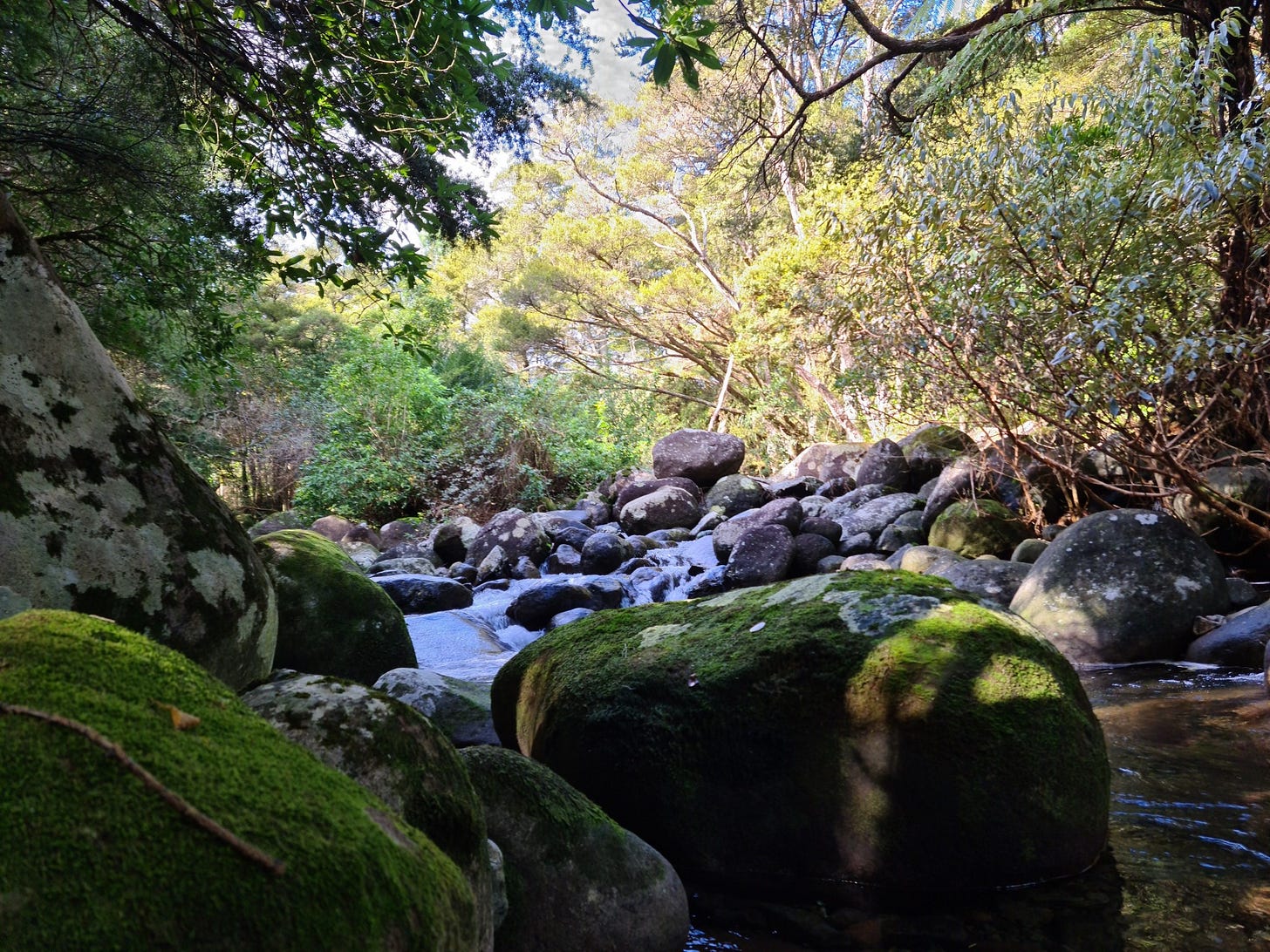In Aotearoa, the story of the land is the story of dispossession. The systematic alienation of Māori land since the signing of Te Tiriti o Waitangi has left Indigenous communities with a fraction of their ancestral whenua. Crown breaches, dubious purchases, legislative takings, and violent enforcement underpinned the theft of over 95% of Māori land by the 20th century. That history is not behind us; it reverberates in every debate over who speaks for the land today, who profits from it, and whose values shape its future.
In this context, the promise of biodiversity and nature-based carbon markets must be interrogated. On paper, these markets offer seductive possibilities: scalable funding for landscape restoration, incentives for stewardship, and new tools to reckon with biodiversity and climate crises. But beneath their surface lies a troubling architecture that risks repeating the injustices they claim to help repair.
Wairere Falls track - clear water and moss-covered rocks in native forest. Ngāti Hinerangi; Wairere Mahi supported by Jobs for Nature funding via Manaaki Kaimai Mamaku Trust.
The pilot of biodiversity and carbon credits in Aotearoa, through voluntary markets and Emissions Trading Schemes (ETS), has largely sidestepped the hard questions of sovereignty and redress. While credits are pitched as climate solutions, they also represent a new frontier of recolonisation by creating a currency for nature supported by land as collateral.
Biodiversity credits commodify nature, assigning dollar values to ecosystems based on market demand, not whakapapa, intergenerational ties, or history. They establish a market logic in which decisions about what is “worth protecting” are not made by matauranga or Western science but by external investors and policy architects. And they often unfold on contested lands, never ceded by Māori, wrapped in regulatory frameworks that recognise profits long before they recognise tino rangatiratanga.
So while Aotearoa has pilots underway, we must critique and observe with systemic lenses for environmental and indigenous justice. The pilot can not decide what works for the market alone; the pilot must also honour Te Tiriti o Waitangi, embedding tino rangatiratanga, kawanatanga and kaitiakitanga as the healing infrastructure.
Markets don't care about whakapapa because they’re not designed to care about anything other than exchangeable units, speculative futures, and fungibility. They are responsive not to sacredness but to scarcity.
This is why the ETS, despite its scale, has failed to reduce emissions. It has succeeded in creating paperwork, obligations, and offsets, but not in curbing climate harm. Its most significant impact has been the threat of regulation, not the mechanics of trading. Emitters have learned to “play the game” while nature remains unhealed.
When we apply this same logic to biodiversity and try to offset extinction or ancestral loss through spreadsheets and credit flows, we risk creating a system where restoration is transactional, not transformational. A system where “indigeneity” becomes a token of legitimacy, a marketable asset rather than a sovereign foundation for ecological justice.
Like all market-based solutions, biodiversity credits should be approached with deep suspicion unless grounded in a constitutional reckoning that begins by honouring Te Tiriti o Waitangi as a binding political truth in Aotearoa.
Access to Te Waihou walkway, showing staged planting for reforestation, a partnership between Pokaiwhenua Catchment Group and Ngāti Raukawa.
Yes, the idea of market funding for nature is humming sweet tunes right now, but I have to decentre my white self and consider tangata whenua. We do not need a new white environmentalism dressed in green finance. We need constitutional reform, we need to honour Te Tiriti, and we need to support the return of stolen land.
Prioritising these actions is how biodiversity credits could become authentic tools for healing, rather than potential new instruments of harm.






I could cry, Jo. So good. So fucked.
Thank you for being a voice not *just* in support of tangata whenua and justice, but for logic!! For sanity!! Nothing about the current solutions are rational, in any language! I get so frustrated with mainstream media that continues to get bogged down in the detail, which is just convenient distraction from real solutions... lets all sing the chorus "true solutions begin with dismantling colonialism and capitalism". We can't even start that work unless we flex our language and start saying things plainly. Hopefully catch you around irl soon xx
Great piece Jo! Thanks! :-)